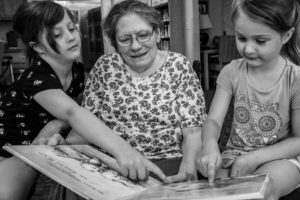Have you seen the British series Last Tango in Halifax? If you haven’t, and you’re interested in seniors, then you should, because it’s awesome! The BBC show aired in the US on PBS beginning in 2013. It’s now available on Netflix, and if you’re looking for a funny, engaging, smart, moving show, I highly recommend it (with, er, a few caveats about plot developments later on)!
Last Tango in Halifax centers around the lives and love of Celia and Alan, a pair of former high school sweethearts who reconnect on Facebook some six decades after she stood him up for a date (accidentally! A note went astray!). At the end of the first episode, after one rollicking date involving a senior-speed car chase, a police station, and a contentious (to say the least) first meeting between Celia’s daughter Caroline and Alan’s daughter Gillian, the couple announces that they’re going to get married.
The show portrays Alan and Celia’s relationship as practically inevitable. In an early episode, Celia tells Caroline, “[Marrying Alan] is what I want. It’s what I’ve always wanted. I know him better than I know myself. Can you understand that?” It may have been only a few days since Celia and Alan found each other again, this line and the show’s first season imply, but their romance is not new. They have a history together, and it’s mostly a matter of catching up and figuring out how to have a relationship now that they’ve had long, full lives without each other.
Those long, full lives mostly involve their previous spouses (both now deceased) and their now-adult daughters. One of the things this show does so well is contrast Alan and Celia’s sweet, easy romance with the chaotic, conflicted romances of Caroline, Gillian, and pretty much everyone else who enters the characters’ orbit. When Alan and Celia come into conflict—and they do, because they are human—it concerns their children and grandchildren. In general, Alan is much more open and accommodating than Celia. While he expresses disappointment with some of Gillian’s more questionable life choices, he’s never outright cruel, as Celia is to Caroline on more than one occasion. Later on, this cruelty causes Alan to question whether they can really be happy together. Later-life romance, Last Tango suggests, requires people to negotiate relationships less as individuals than as members of complicated family networks.
It would be easy for a show like Last Tango to idealize romance between seniors. Early on, it looks like that will happen. For example, as Caroline, Gillian, and the grandchildren worry over their whereabouts, Alan and Celia spend a night locked in a “haunted” local mansion. They’re trapped there accidentally, but they’re fine, and they have a fun time eating chocolates in a historic bed and discussing whether they believe in ghosts. Their daughters’ worry is unnecessary, and the show’s general attitude seems to be: “Seniors are adults! They can take care of themselves! And aren’t they cute?” It’s all true, but it’s not the whole story. Like all of us, seniors are complicated. In the first season finale, after a scene in which Celia expresses bigotry as well as rudeness to Caroline, the relationship nearly ends. Only a heart attack on Alan’s part and a major mea culpa on Celia’s make it possible for them to reunite.
Here’s a spoiler: Alan and Celia do not marry during the show’s first season. They do stay together, and as the show progresses over a couple more seasons, they continue to navigate the challenges of later-life romance and marriage. Last Tango does an excellent job of showing that its aging characters are complex individuals with pasts, presents, and futures. Alan and Celia are a cute couple, but they’re not just a cute couple. They are also two individuals with some very not-cute traits, figuring out how to navigate family and love near the ends of their lives. In short, Last Tango in Halifax does a great job showing that a “third act” romance is possible, and that it’s no easier than romances earlier in life.


 Susan Allison loves reading to children. Her passion for helping those younger than herself goes all the way back to own childhood, when she helped her grandmother in the church nursery. Susan grew up in Lawrenceville, Illinois, where her parents first ran a clothing store and later managed an apartment building. Her first work experience included helping her father with his property management duties.
Susan Allison loves reading to children. Her passion for helping those younger than herself goes all the way back to own childhood, when she helped her grandmother in the church nursery. Susan grew up in Lawrenceville, Illinois, where her parents first ran a clothing store and later managed an apartment building. Her first work experience included helping her father with his property management duties.